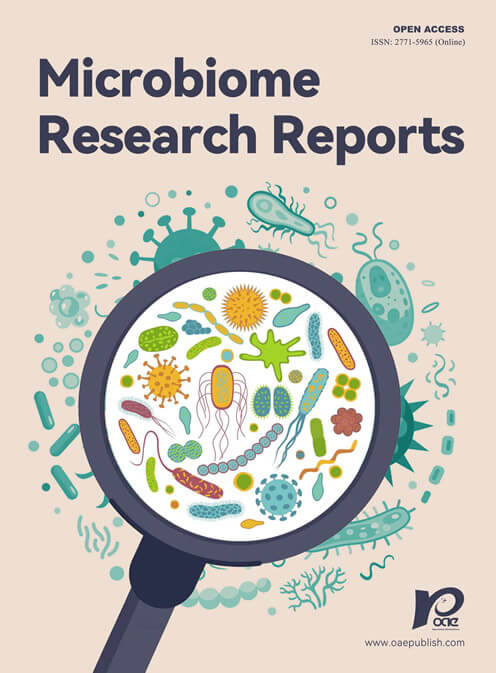REFERENCES
1. Abbasi A, Bazzaz S, Da Cruz AG, et al. A critical review on Akkermansia muciniphila: functional mechanisms, technological challenges, and safety issues. Probiotics Antimicrob Proteins 2024;16:1376-98.
2. Zhao Q, Yu J, Hao Y, et al. Akkermansia muciniphila plays critical roles in host health. Crit Rev Microbiol 2023;49:82-100.
3. Lei W, Cheng Y, Gao J, et al. Akkermansia muciniphila in neuropsychiatric disorders: friend or foe? Front Cell Infect Microbiol 2023;13:1224155.
4. Zhang F, Wang D. Potential of Akkermansia muciniphila and its outer membrane proteins as therapeutic targets for neuropsychological diseases. Front Microbiol 2023;14:1191445.
5. Yan J, Sheng L, Li H. Akkermansia muciniphila: is it the Holy Grail for ameliorating metabolic diseases? Gut Microbes 2021;13:1984104.
6. Wang J, Xu W, Wang R, Cheng R, Tang Z, Zhang M. The outer membrane protein Amuc_1100 of Akkermansia muciniphila promotes intestinal 5-HT biosynthesis and extracellular availability through TLR2 signalling. Food Funct 2021;12:3597-610.
7. Jones LA, Sun EW, Martin AM, Keating DJ. The ever-changing roles of serotonin. Int J Biochem Cell Biol 2020;125:105776.
8. Sun Y, Zhu H, Cheng R, Tang Z, Zhang M. Outer membrane protein Amuc_1100 of Akkermansia muciniphila alleviates antibiotic-induced anxiety and depression-like behavior in mice. Physiol Behav 2023;258:114023.
9. Segers A, de Vos WM. Mode of action of Akkermansia muciniphila in the intestinal dialogue: role of extracellular proteins, metabolites and cell envelope components. Microbiome Res Rep 2023;2:6.
10. Bleibel L, Dziomba S, Waleron KF, Kowalczyk E, Karbownik MS. Deciphering psychobiotics’ mechanism of action: bacterial extracellular vesicles in the spotlight. Front Microbiol 2023;14:1211447.
11. Yaghoubfar R, Behrouzi A, Ashrafian F, et al. Modulation of serotonin signaling/metabolism by Akkermansia muciniphila and its extracellular vesicles through the gut-brain axis in mice. Sci Rep 2020;10:22119.
12. Labellarte MJ, Walkup JT, Riddle MA. The new antidepressants. Selective serotonin reuptake inhibitors. Pediatr Clin North Am 1998;45:1137-55, ix.
13. Song M, Cui M, Fang Z, Liu K. Advanced research on extracellular vesicles based oral drug delivery systems. J Control Release 2022;351:560-72.
14. Hallal S, Tűzesi Á, Grau GE, Buckland ME, Alexander KL. Understanding the extracellular vesicle surface for clinical molecular biology. J Extracell Vesicles 2022;11:e12260.
15. EFSA. Safety of pasteurised Akkermansia muciniphila as a novel food pursuant to regulation (EU) 2015/2283. Available from: https://www.efsa.europa.eu/en/efsajournal/pub/6780. [Last accessed on 4 Sep 2024].
16. Paoletti P, Pellegrino M, Ben-Soussan TD. A three-fold integrated perspective on healthy development: an opinion paper. Brain Sci 2023;13:857.
17. Lazarus R, Folkman S. Stress, appraisal, and coping. Springer Publishing Company; 1984. Available from: https://books.google.com/books/about/Stress_Appraisal_and_Coping.html?id=i-ySQQuUpr8C. [Last accessed on 4 Sep 2024].
18. Scott SB, Graham-Engeland JE, Engeland CG, et al. The Effects of Stress on Cognitive Aging, Physiology and Emotion (ESCAPE) Project. BMC Psychiatry 2015;15:146.
19. Rademacher L, Kraft D, Eckart C, Fiebach CJ. Individual differences in resilience to stress are associated with affective flexibility. Psychol Res 2023;87:1862-79.
20. Palomero-Gallagher N, Amunts K. A short review on emotion processing: a lateralized network of neuronal networks. Brain Struct Funct 2022;227:673-84.
21. Skonieczna-Żydecka K, Łoniewski I, Marlicz W, Karakiewicz B. Gut microbiota and its potential contribution to human emotional disorders. Available online: http://www.medmikro.org/mikrobiota-jelitowa-jako-potencjalna-przyczyna-zaburzen-funkcjonowania-emocjonalnego-czlowieka?lang=pl. [Last accessed on 4 Sep 2024].
22. Landowski J. Neurobiology of stress. Neuropsych Neuro Pol 2007;2:26-36. Available from: https://www.termedia.pl/Artykul-pogladowy-Neurobiologia-reakcji-stresowej,46,8682,0,0.html. [Last accessed on 4 Sep 2024]
23. Chu B, Marwaha K, Sanvictores T, Awosika AO, Ayers D. Physiology, stress reaction. In: StatPearls; StatPearls Publishing: Treasure Island (FL), 2023.
25. Marlicz W, Yung DE, Skonieczna-Żydecka K, et al. From clinical uncertainties to precision medicine: the emerging role of the gut barrier and microbiome in small bowel functional diseases. Expert Rev Gastroenterol Hepatol 2017;11:961-78.
26. Silvernale C, Garcia-Fischer I, Staller K. Relationship between psychological trauma and irritable bowel syndrome and functional dyspepsia in a joint hypermobility syndrome/ehlers-danlos syndrome patient population. Dig Dis Sci 2024;69:870-5.
27. Santucci NR, Velasco-Benitez CA, Cunningham N, et al. Psychological distress and coping efficacy in children with disorders of gut-brain interaction. Neurogastroenterol Motil 2024;36:e14724.
28. Stachowska E, Maciejewska D, Ryterska K, et al. Abdominal pain and disturbed bowel movements are frequent among young people. A population based study in young participants of the Woodstock Rock Festival in Poland. J Gastrointestin Liver Dis 2018;27:379-83.
29. Skonieczna-Żydecka K, Stachowska E, Maciejewska D, et al. The digestive health among participants of the Woodstock Rock Festival in Poland - a cross-sectional survey. Int J Environ Res Public Health 2018;15:2256.
30. Nazarewska A, Lewandowski K, Kaniewska M, Rosołowski M, Marlicz W, Rydzewska G. Irritable bowel syndrome following COVID-19: an underestimated consequence of SARS-CoV-2 infection. Pol Arch Intern Med 2022;132:16323.
31. Nazarewska A, Lewandowski K, Kaniewska M, et al. Long-lasting dyspeptic symptoms - another consequence of the COVID-19 pandemic? Prz Gastroenterol 2023;18:175-82.
32. Person H, Keefer L. Psychological comorbidity in gastrointestinal diseases: update on the brain-gut-microbiome axis. Prog Neuropsychopharmacol Biol Psychiatry 2021;107:110209.
33. Davis MT, Holmes SE, Pietrzak RH, Esterlis I. Neurobiology of chronic stress-related psychiatric disorders: evidence from molecular imaging studies. Chronic Stress 2017;1:2470547017710916.
34. Zuckerman M. Diathesis-stress models. In: Vulnerability to psychopathology: a biosocial model. Washington, DC: American Psychological Association; 1999. pp. 3-23.
35. Misera A, Łoniewski I, Palma J, et al. Clinical significance of microbiota changes under the influence of psychotropic drugs. An updated narrative review. Front Microbiol 2023;14:1125022.
36. Ingram RE, Luxton DD. Vulnerability-stress models. In: Hankin BL, Abela JRZ, editors. Development of psychopathology: a vulnerability-stress perspective. SAGE Publications, Inc.; 2005. pp. 32-46.
37. Zubin J, Spring B. Vulnerability - a new view of schizophrenia. J Abnorm Psychol 1977;86:103-26.
38. de Vos WM, Tilg H, Van Hul M, Cani PD. Gut microbiome and health: mechanistic insights. Gut 2022;71:1020-32.
39. Shanahan F, Ghosh TS, O’Toole PW. The healthy microbiome - What is the definition of a healthy gut microbiome? Gastroenterology 2021;160:483-94.
41. Kundu P, Blacher E, Elinav E, Pettersson S. Our gut microbiome: the evolving inner self. Cell 2017;171:1481-93.
42. Skonieczna-Żydecka K, Marlicz W, Misera A, Koulaouzidis A, Łoniewski I. Microbiome - the missing link in the gut-brain axis: focus on its role in gastrointestinal and mental health. J Clin Med 2018;7:521.
43. Liang S, Jin F, Jia C. Editorial: the effect of gut microbiota on the brain structure and function. Front Integr Neurosci 2023;17:1226664.
44. Kim YK, Shin C. The microbiota-gut-brain axis in neuropsychiatric disorders: pathophysiological mechanisms and novel treatments. Curr Neuropharmacol 2018;16:559-73.
45. Marin IA, Goertz JE, Ren T, et al. Microbiota alteration is associated with the development of stress-induced despair behavior. Sci Rep 2017;7:43859.
46. Watanabe Y, Arase S, Nagaoka N, Kawai M, Matsumoto S. Chronic psychological stress disrupted the composition of the murine colonic microbiota and accelerated a murine model of inflammatory bowel disease. PLoS One 2016;11:e0150559.
47. Knowles SR, Nelson EA, Palombo EA. Investigating the role of perceived stress on bacterial flora activity and salivary cortisol secretion: a possible mechanism underlying susceptibility to illness. Biol Psychol 2008;77:132-7.
48. Kato-Kataoka A, Nishida K, Takada M, et al. Fermented milk containing Lactobacillus casei strain shirota preserves the diversity of the gut microbiota and relieves abdominal dysfunction in healthy medical students exposed to academic stress. Appl Environ Microbiol 2016;82:3649-58.
49. Gao F, Guo R, Ma Q, et al. Stressful events induce long-term gut microbiota dysbiosis and associated post-traumatic stress symptoms in healthcare workers fighting against COVID-19. J Affect Disord 2022;303:187-95.
50. Molina-Torres G, Rodriguez-Arrastia M, Roman P, Sanchez-Labraca N, Cardona D. Stress and the gut microbiota-brain axis. Behav Pharmacol 2019;30:187-200.
51. Naseribafrouei A, Hestad K, Avershina E, et al. Correlation between the human fecal microbiota and depression. Neurogastroenterol Motil 2014;26:1155-62.
52. Nguyen TT, Kosciolek T, Eyler LT, Knight R, Jeste DV. Overview and systematic review of studies of microbiome in schizophrenia and bipolar disorder. J Psychiatr Res 2018;99:50-61.
53. Nguyen TT, Kosciolek T, Maldonado Y, et al. Differences in gut microbiome composition between persons with chronic schizophrenia and healthy comparison subjects. Schizophr Res 2019;204:23-9.
54. Stasi C, Nisita C, Cortopassi S, et al. Subthreshold psychiatric psychopathology in functional gastrointestinal disorders: can it be the bridge between gastroenterology and psychiatry? Gastroenterol Res Pract 2017;2017:1953435.
55. Skonieczna-Żydecka K, Łoniewski I, Misera A, et al. Second-generation antipsychotics and metabolism alterations: a systematic review of the role of the gut microbiome. Psychopharmacology 2019;236:1491-512.
56. Söderholm JD, Yates DA, Gareau MG, Yang PC, MacQueen G, Perdue MH. Neonatal maternal separation predisposes adult rats to colonic barrier dysfunction in response to mild stress. Am J Physiol Gastrointest Liver Physiol 2002;283:G1257-63.
57. Lennon EM, Maharshak N, Elloumi H, Borst L, Plevy SE, Moeser AJ. Early life stress triggers persistent colonic barrier dysfunction and exacerbates colitis in adult IL-10-/- mice. Inflamm Bowel Dis 2013;19:712-9.
58. Smith F, Clark JE, Overman BL, et al. Early weaning stress impairs development of mucosal barrier function in the porcine intestine. Am J Physiol Gastrointest Liver Physiol 2010;298:G352-63.
59. Spadoni I, Zagato E, Bertocchi A, et al. A gut-vascular barrier controls the systemic dissemination of bacteria. Science 2015;350:830-4.
60. Shiels PG, Buchanan S, Selman C, Stenvinkel P. Allostatic load and ageing: linking the microbiome and nutrition with age-related health. Biochem Soc Trans 2019;47:1165-72.
61. Westfall S, Iqbal U, Sebastian M, Pasinetti GM. Gut microbiota mediated allostasis prevents stress-induced neuroinflammatory risk factors of Alzheimer’s disease. Prog Mol Biol Transl Sci 2019;168:147-81.
62. Liu Y, Wang J, Wu C. Modulation of gut microbiota and immune system by probiotics, pre-biotics, and post-biotics. Front Nutr 2021;8:634897.
63. Li N, Wang Q, Wang Y, et al. Oral probiotics ameliorate the behavioral deficits induced by chronic mild stress in mice via the gut microbiota-inflammation axis. Front Behav Neurosci 2018;12:266.
64. Ge X, Ding C, Zhao W, et al. Antibiotics-induced depletion of mice microbiota induces changes in host serotonin biosynthesis and intestinal motility. J Transl Med 2017;15:13.
65. Kennedy EA, King KY, Baldridge MT. Mouse microbiota models: comparing germ-free mice and antibiotics treatment as tools for modifying gut bacteria. Front Physiol 2018;9:1534.
66. Zareie M, Johnson-Henry K, Jury J, et al. Probiotics prevent bacterial translocation and improve intestinal barrier function in rats following chronic psychological stress. Gut 2006;55:1553-60.
67. Emge JR, Huynh K, Miller EN, et al. Modulation of the microbiota-gut-brain axis by probiotics in a murine model of inflammatory bowel disease. Am J Physiol Gastrointest Liver Physiol 2016;310:G989-98.
68. Messaoudi M, Lalonde R, Violle N, et al. Assessment of psychotropic-like properties of a probiotic formulation (Lactobacillus helveticus R0052 and Bifidobacterium longum R0175) in rats and human subjects. Br J Nutr 2011;105:755-64.
69. Messaoudi M, Violle N, Bisson JF, Desor D, Javelot H, Rougeot C. Beneficial psychological effects of a probiotic formulation
70. Government of Canada. Product Information. Available from: https://health-products.canada.ca/lnhpd-bdpsnh/info?licence=80021343. [Last accessed on 4 Sep 2024].
71. Arksey H, O’Malley L. Scoping studies: towards a methodological framework. Int J Soc Res Methodol 2005;8:19-32.
72. Pham MT, Rajić A, Greig JD, Sargeant JM, Papadopoulos A, McEwen SA. A scoping review of scoping reviews: advancing the approach and enhancing the consistency. Res Synth Methods 2014;5:371-85.
73. Mazzantini D, Calvigioni M, Celandroni F, Lupetti A, Ghelardi E. Spotlight on the compositional quality of probiotic formulations marketed worldwide. Front Microbiol 2021;12:693973.
74. Kolaček S, Hojsak I, Berni Canani R, et al; ESPGHAN Working Group for Probiotics and Prebiotics. Commercial probiotic products: a call for improved quality control. A position paper by the ESPGHAN Working Group for probiotics and prebiotics. J Pediatr Gastroenterol Nutr 2017;65:117-24.
76. Belzer C, de Vos WM. Microbes inside - from diversity to function: the case of Akkermansia. ISME J 2012;6:1449-58.
77. Cani PD, Depommier C, Derrien M, Everard A, de Vos WM. Akkermansia muciniphila: paradigm for next-generation beneficial microorganisms. Nat Rev Gastroenterol Hepatol 2022;19:625-37.
78. Cani PD, de Vos WM. Next-generation beneficial microbes: the case of Akkermansia muciniphila. Front Microbiol 2017;8:1765.
79. Wang L, Tang L, Feng Y, et al. A purified membrane protein from Akkermansia muciniphila or the pasteurised bacterium blunts colitis associated tumourigenesis by modulation of CD8+ T cells in mice. Gut 2020;69:1988-97.
80. Plovier H, Everard A, Druart C, et al. A purified membrane protein from Akkermansia muciniphila or the pasteurized bacterium improves metabolism in obese and diabetic mice. Nat Med 2017;23:107-13.
81. Ashrafian F, Keshavarz Azizi Raftar S, Shahryari A, et al. Comparative effects of alive and pasteurized Akkermansia muciniphila on normal diet-fed mice. Sci Rep 2021;11:17898.
82. Wang J, Xiang R, Wang R, et al. The variable oligomeric state of Amuc_1100 from Akkermansia muciniphila. J Struct Biol 2020;212:107593.
83. Shi M, Yue Y, Ma C, Dong L, Chen F. Pasteurized Akkermansia muciniphila ameliorate the LPS-induced intestinal barrier dysfunction via modulating AMPK and NF-κB through TLR2 in Caco-2 cells. Nutrients 2022;14:764.
84. Gu Z, Pei W, Shen Y, et al. Akkermansia muciniphila and its outer protein Amuc_1100 regulates tryptophan metabolism in colitis. Food Funct 2021;12:10184-95.
85. Myint AM, Halaris A. Imbalances in kynurenines as potential biomarkers in the diagnosis and treatment of psychiatric disorders. Front Psychiatry 2022;13:913303.
86. Ottman N, Reunanen J, Meijerink M, et al. Pili-like proteins of Akkermansia muciniphila modulate host immune responses and gut barrier function. PLoS One 2017;12:e0173004.
87. Muccioli GG, Naslain D, Bäckhed F, et al. The endocannabinoid system links gut microbiota to adipogenesis. Mol Syst Biol 2010;6:392.
88. Carabotti M, Scirocco A, Maselli MA, Severi C. The gut-brain axis: interactions between enteric microbiota, central and enteric nervous systems. Ann Gastroenterol 2015;28:203-9.
89. Nie X, Kitaoka S, Tanaka K, et al. The innate immune receptors TLR2/4 mediate repeated social defeat stress-induced social avoidance through prefrontal microglial activation. Neuron 2018;99:464-79.e7.
90. Quave CB, Nieto SJ, Haile CN, Kosten TA. Immune receptor toll-like receptor 4 contributes to stress-induced affective responses in a sex-specific manner. Brain Behav Immun Health 2021;14:100248.
91. Figueroa-Hall LK, Paulus MP, Savitz J. Toll-like receptor signaling in depression. Psychoneuroendocrinology 2020;121:104843.
92. Hung YY, Huang KW, Kang HY, Huang GY, Huang TL. Antidepressants normalize elevated Toll-like receptor profile in major depressive disorder. Psychopharmacology 2016;233:1707-14.
93. Hung YY, Kang HY, Huang KW, Huang TL. Association between toll-like receptors expression and major depressive disorder. Psychiatry Res 2014;220:283-6.
94. Chen T, Wang R, Duan Z, et al. Akkermansia muciniphila protects against psychological disorder-induced gut microbiota-mediated colonic mucosal barrier damage and aggravation of colitis. Front Cell Infect Microbiol 2021;11:723856.
95. Ding Y, Bu F, Chen T, et al. A next-generation probiotic: Akkermansia muciniphila ameliorates chronic stress-induced depressive-like behavior in mice by regulating gut microbiota and metabolites. Appl Microbiol Biotechnol 2021;105:8411-26.
96. Cheng R, Xu W, Wang J, Tang Z, Zhang M. The outer membrane protein Amuc_1100 of Akkermansia muciniphila alleviates the depression-like behavior of depressed mice induced by chronic stress. Biochem Biophys Res Commun 2021;566:170-6.
97. Guo H, Liu X, Chen T, Wang X, Zhang X. Akkermansia muciniphila improves depressive-like symptoms by modulating the level of 5-HT neurotransmitters in the gut and brain of mice. Mol Neurobiol 2024;61:821-34.
98. Cheng R, Zhu H, Sun Y, Hang T, Zhang M. The modified outer membrane protein Amuc_1100 of Akkermansia muciniphila improves chronic stress-induced anxiety and depression-like behavior in mice. Food Funct 2022;13:10748-58.
99. Pomeranian Medical University Szczecin The effects of the anti-inflammatory microbe - Pasteurized Akkermansia Muciniphila (PAM) on symptoms of somatic and mental stress in healthcare professionals. 2023. Available from: https://clinicaltrial.be/en/details/259148?per_page=20&only_recruiting=0&only_eligible=0. [Last accessed on 4 Sep 2024].
100. Marlicz W, Koulaouzidis A, Charisopoulou D, et al. Burnout in healthcare - the Emperor’s new clothes. Prz Gastroenterol 2023;18:274-80.
101. Fasanella NA, Custódio CG, Cabo JSD, Andrade GS, Almeida FA, Pavan MV. Use of prescribed psychotropic drugs among medical students and associated factors: a cross-sectional study. Sao Paulo Med J 2022;140:697-704.
102. Flowers SA, Evans SJ, Ward KM, McInnis MG, Ellingrod VL. Interaction between atypical antipsychotics and the gut microbiome in a bipolar disease cohort. Pharmacotherapy 2017;37:261-7.
103. Depommier C, Everard A, Druart C, et al. Supplementation with Akkermansia muciniphila in overweight and obese human volunteers: a proof-of-concept exploratory study. Nat Med 2019;25:1096-103.









